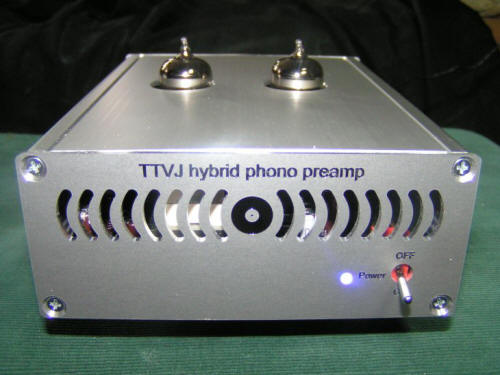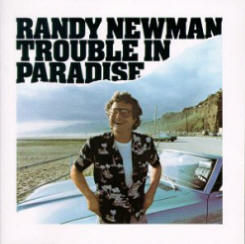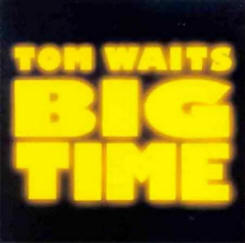
You are reading the older HTML site
Positive Feedback ISSUE
40november/december 2008
ttvj (todd the vinyl junkie)
Millet Hybrid phono preamplifier
as reviewed by Ed Kobesky

|
Here at Positive Feedback's prestigious Scranton, Pennsylvania branch, we're a frugal lot. Not cheap, understand. It's just that we have lots of interests besides music—Scotch whisky, premium cigars, imported cars, and so on. Since those cases of The Glenlivet 15 French Oak Reserve ain't gonna buy themselves, we're forced to spread our disposable incomes around carefully.
That's why, despite flirtations with more expensive phono stages from Creek, Lehmann Audio, Acurus, Pro-Ject and others, we've stuck with the $199 Rotel RQ-970BX for many years. The reason is simple: while there are better phono stages for $400 or $800, in our experience, they simply haven't been two times better for twice the price, let alone four times as good. In fact, the Rotel's MSRP hasn't changed in years, making it an even better value with each flip of the calendar.
Therefore, when we consider a new phono stage, it has to be something special, something worth skimping for. When we ran across the new phono stage from mail order analog specialist Todd The Vinyl Junkie (TTVJ), it looked way more interesting than anything we'd seen in the sub-$1000 class for some time.
How does this strike you for a budget-priced route to vinyl nirvana: a solid state/tube hybrid phono stage designed by Pete Millett and built like a budget Nagra—by hand, I might add—with all of the loading options and flexibility most people will ever need, for $850. Pretty interesting, we thought. Must be another triumph of western engineering combined with Chinese manufacturing. But wait …we thought wrong. The object of our admiration is actually made by hand in the good old US of A. Even better, right?
Though we know Todd sells some of the best lines around, we weren't aware that he actually manufactures his own line of products including the phono stage in question and some killer headphone amps. "Well, I call myself the Vinyl Junkie," he told me, "so I figured it was about time I built a phono stage that I myself would want to own."
Todd likes the warmth and humanity of tubes, but he also like the articulation, detail and tight bass of solid-state components. So when his old friend Pete Millett showed up with a phono stage design, the two put their heads together and tweaked it to provide the best of both worlds. The end result is a good value for the money, especially considering that Todd stuffs and solders the boards himself, then ships them off to Millett for final hand assembly and a rigorous quality control process. Essentially, this is a high-end boutique product at mass market prices.
"I'm a tube guy at heart, but I hate it when something sounds overly tubey," Todd explained. "Tube stuff shouldn't sound fuzzy or artificially warm. That's where the hybrid design comes into play. It's not edgy sounding but it has definition and detail." True to his word, the Millett Hybrid is exactly as he describes. For many people, this may be all they need to know, especially given the low price.
The Millett Hybrid is an even better value when you consider how much more music it wrings from relatively inexpensive gear. You don't need a $2000 rig to get your money's worth out of it. On the contrary, today's $200 or $300 cartridges (and $500 turntables, for that matter) are such sophisticated performers that entry-level phono stages often don't do them justice.
I was immediately thrilled by the amount of music it shook loose from an old but still relevant Sony PS-X600 Biotracer turntable and Ortofon's excellent new $199 2M Blue cartridge (reviewed here). The Millett Hybrid has two inputs: one for moving magnets, and one for moving coils with adjustable gain and loading. Since the moving magnet section is plug and play, I just tapped in and starting playing music.


The first record I spun was Randy Newman's Trouble in Paradise (Warner Bros. 23755-1). Barely warmed up, and with current production tubes installed instead of the NOS beauties Todd recommends, I immediately noted the excellent articulation combined with silky, extended highs. The Millett Hybrid has more finesse than its price suggests. It also has such tight and tuneful bass that it took me awhile to adjust. Next up was Carmina Burana (Columbia Quadrophonic MQ 33172)—how's that for contrast!—and the Millett Hybrid did a great job maintaining separation between individual instruments as well as creating an appropriately-sized soundstage.
I was having so much fun that I listened to it in exactly that configuration for over a month. By the time I moved to my Rega Planar 3 and some high- and low-output Denon and Audio-Technica moving coil cartridges, I could really see why the Millett hybrid is an equally smart investment for entry-level buyers as it is for more seasoned audiophiles. It has loading options galore—more than most people shopping in this price range will ever need. There are no fiddly internal DIP switches to mess with, either, just simple dials on the rear panel. No instruction manual is included and the unit is so simple to operate that none is really needed. However, should you have any questions about which settings work best with your particular cartridge, a simple call to Todd will yield personal recommendations.
Something else: the Millett Hybrid is such a smoothie that it makes budget gear sound just a bit more swank than it really is. It managed to gloss over a bit of grain produced by the direct drive Sony/Ortofon combo without sacrificing detail in the process. It even seemed to open up the soundstage substantially, both laterally and dimensionally, compared with the Rotel. Pair it with one of Denon's big-sounding moving coil cartridges and you're in for a massive, Cinemascope presentation that may be too much of a good thing for some but which personally thrilled the hell out of me.
As you might expect, the midrange was rich and full-bodied. There was a surprising amount of texture to vocals—the kind of texture that tells you whether or not Sinatra laid off the cigarettes for a few days before a recording session. The sound quality of Tom Waits' Big Time (Island 790987-1) varies drastically from cut to cut, but no matter how distant the music was or how much tape hiss was present, the harmonics were so appealingly right that it was easy to listen past the flaws. Instruments retained the immediacy and transient speed I expect from a good solid-state preamp with the depth and warm-blooded humanity that I crave from tubes.
Bright recordings still sounded bright, which is as it should be with an accurate component of any kind. A particularly nasty pressing of Bruce Springsteen's "Born to Run" (Cooumbia QC 38653) was thin and hard, with a brittle top end, and no more tolerable played through the Millett than any solid-state gear.
Of course—and I hate making this disclaimer since it's true of all budget components—the Millett Hybrid lacks the nth degree of inner detail and transparency that marks the very best, along with some dynamic limitations that may nag listeners who predominately favor hard rock and large scale orchestral works. The thing is, the Millett Hybrid has a way of making you forget what you're missing. It doesn't romanticize or overly tube-ify the music, either. As with all good components with certain limitations, it restricts its sins to those of omission.
I enjoyed my time with the Millett Hybrid so much that I completely forgot about the NOS tubes until it was too late. Oh well. If it sounds this pleasing with run-of-the-mill glass, buyers have nowhere to go but up, and that's the point. This is a good phono stage to buy now along with your entry-level turntable. It's also a good phono stage to continue using when you upgrade your cartridge. And when you upgrade your entire rig, it'll still be a good phono stage and will probably continue to satisfy even after you've spent many times its modest price on upstream improvements.
The TTVJ Millett Hybrid is a consistently pleasant sounding piece of gear that's compact, well built, flexible, easy to live with, and musically and harmonically right. At Positive Feedback Scranton, we're thinking it's time to cut back on our other expensive hobbies just long enough to afford one of our own. Ed Kobesky
Millet Hybrid
Retail: $850
Todd The Vinyl Junkie
web address:
www.ttvj.com

